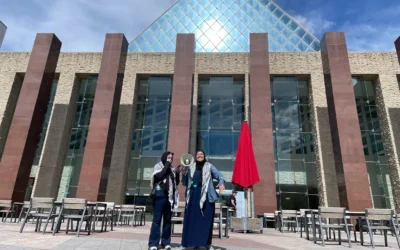Alberta’s public health guidelines are woefully inadequate. The rules around social distancing, masks, and especially the closures and capacity limits imposed on businesses are half-measures at best, that are effective at preventing the spread of COVID in just a subset of circumstances.
If you’ve been paying attention to government policy, you’ve probably heard of droplets: the type of particles that are primarily responsible for transmitting COVID. These are large enough to fall to the ground rather than stay suspended in the air. Most provincial policy — and national policy, for that matter — addresses these particles. They cannot breach a two-layer cloth mask, and generally won’t travel further than about two metres from some one’s mouth.
However, this is not the only way COVID is transmitted. The virus can and does latch on to much smaller particles, called aerosols, which work a little more like a gas. Conor Ruzycki, a PhD candi date in the mechanical engineering department of the University of Alberta who has been studying pharmaceutical aerosol technology for around 10 years, offers this explanation: “When you used to be able to smoke in restaurants, I remember going into places that would have smoking sections … and you could see a big cloud in the space. That cloud is made up of aerosols.”
Ruzycki says the small size of the particles allow them to breach standard cloth masks, and the fact that they fill the space they are in means aerosol transmission completely invalidates the two-metre social distancing rule when it comes to indoor spaces.
“When you’re sharing an indoor space with some body else, there’s no real concept of safe distance,” he says.
So when the province decided to reopen restaurants and bars in February, or gyms in March, the full dangers of doing so were not considered.
The province’s authority over public health influences our collective conversation around the virus. When a restaurant or gym reopens its doors, or an art gallery or festival comes to town, they don’t put up disclaimers saying the business is 100 per cent guaranteed to be safe — they say some variation of “our establishment is in line with the public health guidelines outlined by the Government of Alberta.” And, most of you have that one friend who has been going to the bar every weekend since, and when questioned just says, “it’s not against the rules.”
The province’s rules affect other levels of governmental decision-making too. After the province announced it’s reopening strategy, Edmonton city council’s emergency advisory committee met on Jan. 27 to discuss the possibility of creating bylaws to restrict businesses at a municipal level, but ultimately decided to continue following the province’s lead. The provincial government claimed it was both safe and economically beneficial to reopen, but in the meeting, Coun. Aaron Paquette questioned this, saying “other jurisdictions that have been proactive have virtually eradicated this virus,” and “a lockdown has a smaller economic impact than extended, softer measures.”
“Whether we agree with (the province’s approach), this is what the explanation has been,” responded city manager Andre Corbould.
“Well, if that’s their justification, then I guess that’s that,” Paquette closed.
This has been the general pattern of commu nication at city council since: someone brings up a policy or practice that may be unsafe. Someone else says it’s up to the province. Everyone shrugs.
To be fair, it isn’t just the province that isn’t taking aerosols seriously. Ruzycki, along with 363 other physicians, scientists, and engineers, cosigned a letter sent to the federal government on Jan. 4 urging it to do more to address aerosol transmission.
The federal government updated its website to include information on aerosol transmission following the letter, but no changes to policies or guidelines were made.
If aerosol transmission is so well known in the scientific community, then why do policy-makers not seem to even acknowledge it? It is hard to say, but one possibility is that aerosol transmission poses a danger to indoor environments especially, and addressing it would almost certainly mean businesses would have to stay closed for much longer than they’ve had to in the past.
Considering the Province’s long-standing devotion to keeping Alberta “open for business,” I wouldn’t put it past them to put business interests ahead of public safety.





0 Comments